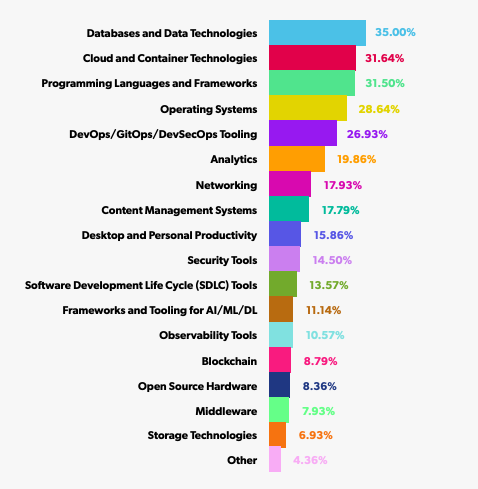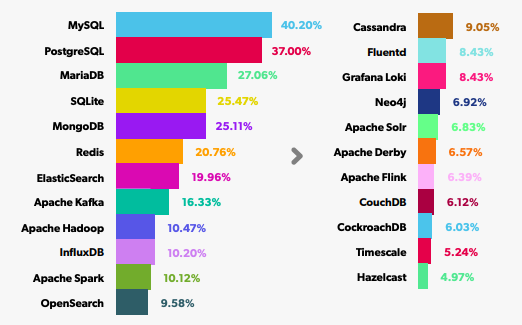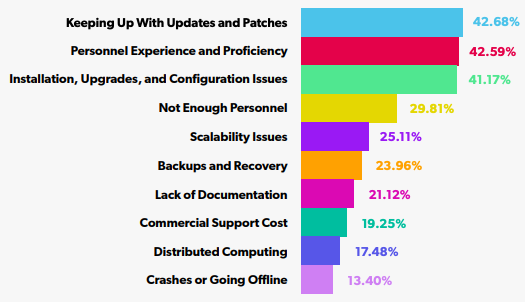
Comparing the Top Open Source Databases and Data Technologies of 2024
Databases and data technologies are one of the fastest growing areas in open source. Today’s leading open source data technologies exceed the capabilities of traditional databases, and many organizations rely on multiple technologies to stream data, create analytics, and integrate data from various sources. Given the massive amount of data being created and processed by modern applications, finding the right database for your needs is more important than ever before.
In this blog, we look at the top open source databases and data technologies, according to the 2,000+ OSS users surveyed for our State of Open Source Report.
Organizations Are Investing Heavily in Open Source Data Technologies
When we asked respondents about which open source software categories were receiving the most investment from their organizations, 35% selected databases and data technologies, putting it in first place. Containers and container technologies came in second (same ranking as in 2023), and last year's top category, SDLC tools, fell to the 11th spot.
Which Categories of Open Source Software Has Your Organization Invested In the Most?

Given that the digital economy is powered by data and data analytics, this is not surprising. The recent proliferation of AI/ML/DL applications, which require huge amounts of data for training models, also explains why organizations are investing so much in this technology area.
When we looked at the data by organization size, we discovered that only the largest enterprises are prioritizing containers ahead of data technologies. Mid-size companies show a fairly even split of investment across the two categories, while smaller companies — and particularly early stage startups — are more likely to be allocating budget, staff, and other resources to databases and data technologies over containers.
| Number of Employees | Data Technologies | Containers |
| More than 5,000 | 27.66% | 38.30% |
| 500 to 5,000 | 38.15% | 37.04% |
| 100 to 499 | 41.46% | 34.15% |
| Fewer than 100 | 38.24% | 31.70% |
| Early stage startup | 30.41% | 18.24% |
Top Open Source Databases and Data Technologies
This year we saw some shuffling of the usual suspects in this category. The three most used open source databases are MySQL, PostgreSQL, and MariaDB, and MySQL beat out Postgres for the #1 spot — in all regions except Europe.
Which Open Source Data Technologies Does Your Organization Use Today?

MongoDB declined in popularity, dropping from 3rd to 5th place this year. It's also important to note that after switching from a GNU Affero General Public License (AGPL) to a Server Side Public License (SSPL) in 2018, MongoDB is considered source-available, not open source, software. However, we still included it here because of its open source origins. We likewise decided to include Elasticsearch and CockroachDB in this category even though they also do not meet OSI's definition for open source software due to their licenses.
Redis usage increased by 10% year over year, although the fallout from their recent license change and the resulting fork (Valkey) may have a negative impact. Spark and Kafka, which can be used in AI/ML/DL applications, both saw gains this year as well.
For head-to-head comparisons of open source databases, check out these blogs:
- PostgreSQL vs. MySQL
- MySQL vs. SQLite
- MariaDB vs. MySQL
- PostgreSQL vs. MariaDB
- PostgreSQL vs. MongoDB
- EnterpriseDB vs. PostgreSQL
- Cassandra vs. MongoDB
Challenges With Open Source Data Technologies
Databases and data technologies can be notoriously complex to work with and managing data is a huge responsibility not to be taken lightly. We asked survey respondents about the biggest challenges they encounter working with open source databases and data technologies:
What Are the Main Support Challenges With the Open Source Data Technologies Your Organization Is Using?

Something to note here is that two of the top four challenges relate to personnel. When it comes to complex data technologies, you need experienced, skilled architects familiar with large-scale enterprise deployments. If one person on your team who is familiar with a particular technology leaves the organization, it can be challenging (and expensive) to find a replacement.
It's also worth mentioning that the other significant challenges (installation, upgrades, and configuration issues; keeping up with updates and patches) would presumably be less of an issue if personnel had the necessary experience and proficiency.
For a breakdown of top challenges by industry, see page 24 of the State of Open Source Report.
Back to topOpen Source Database Support, Delivered by Experts
Let OpenLogic Enterprise Architects tackle your toughest data challenges. We provide 24/7 technical support for all the top open source databases and data technologies, including PostgreSQL, MySQL, MariaDB, Cassandra, InfluxDB, Redis, SQLite, HSQLDB, Spark, Hadoop, and CouchDB.
Learn About Our Support
Final Thoughts
This is an area of open source that we expect to continue to grow in the coming years, as streaming data, data analytics, and AI become increasingly integral to modern enterprise applications across virtually all industries. In our digital age, data is a hot commodity and there is high demand for technologies that can process, store, and integrate large volumes of data securely and swiftly. Those with expertise working with the top open source databases and data technologies will be in high demand for the foreseeable future.
Want More Insights? Read the Full Report
Get your free copy of the State of Open Source Report for more analysis on open source frameworks, Enterprise Linux distributions, infrastructure technologies and more!
Additional Resources
- On-Demand Webinar - Inside the State of Open Source: 2024 Report Analysis
- White Paper - Decision Maker's Guide to Open Source Databases
- Blog - Pros and Cons of Open Source Databases
- Guide - Intro to Open Source Databases
- Course - MySQL and PostgreSQL Training
- Blog - Guide to Key-Value Databases